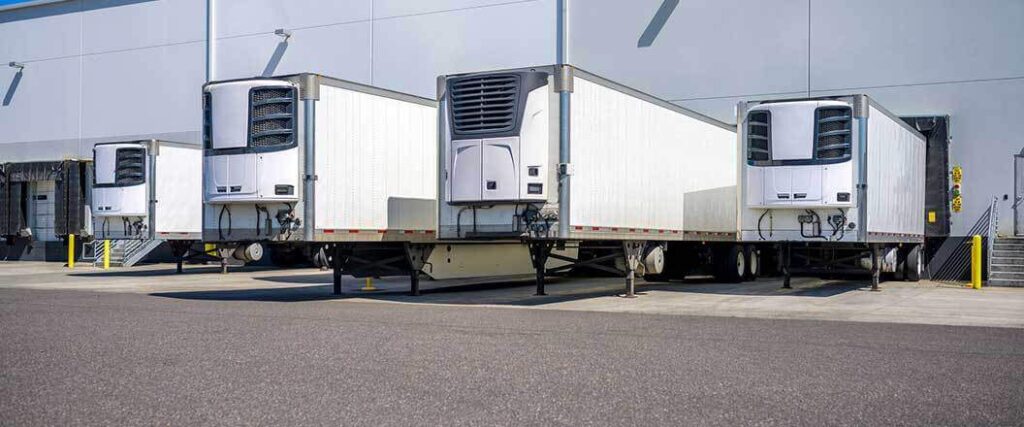Having reefer cargo insurance year-round and on all deliveries shouldn’t just be viewed as an option - it’s a necessity. Cargo traveling in refrigerated trucks, or reefers, is usually very valuable and time-sensitive. Just that combination alone should convince you of its need.
The Department of Transportation (DOT) cannot require companies to carry refrigerated cargo insurance. However, shippers and forwarders may refuse to transport refrigerated products unless reefer cargo insurance is added. This insurance is meant to protect companies and shippers from financial loss in case of spoiled goods.
Find out when you may need refrigerator cargo truck insurance and what to look for when choosing coverage options.

It’s already considered a best practice to carry additional cargo insurance. You want something that goes beyond the basic liability insurance carriers are required by law to carry. When transporting perishables, refrigerated truck insurance becomes even more important.
Reefer cargo insurance is provided specifically to shippers and drivers who want to protect themselves from financial loss when transporting perishable goods.
Carriers and forwarders usually carry liability-only insurance policies for their commercial trucks. This is not cargo insurance. When you read the fine print, these are actually meant to protect the carrier more than the customer. It doesn’t make liability plans bad - and for some loads, it might be enough.
Our article, "What is Cargo Insurance?" can provide you with more specific answers.
It’s difficult to say the same about products that travel in reefer trucks. Simply because it’s perishable, freight that requires temperature control is always classified as a high-value/high-risk shipment.
Examples of refrigerated cargo that benefit from reefer truck insurance are:
Obtaining the correct type and the right amount of special coverage will depend on what sensitive goods you ship most often.
Agricultural products are some of the most commonly shipped, representing a majority of reefer truck use in the United States. These are also most likely to represent somewhat lower insurance costs.
| Commodity | Pounds Shipped Via Reefer Truck |
| Potatoes | 1,807,584 |
| Apples | 1,258,833 |
| Dry Onions | 980,688 |
| Watermelons | 969,681 |
| Oranges | 899,910 |
As farmers find ways to grow more food to disperse to an ever growing population, reefer cargo needs are expanding. Companies who want to ship these products need to be aware of the risks and costs of doing so safely.

Once you’ve made the decision to start shopping around for cargo insurance companies, it’s good to have a clear breakdown of your needs.
First, you want to make sure that the reefer insurance covers the type of vehicle your goods are transported in.
Common ways to transport refrigerated cargo include:
Some insurance agencies may limit coverage to domestic transportation, which could exclude goods in marine reefers. Others may have restrictions on the gensets and reefer units used for temperature control.
Secondly, you want to make sure your cargo isn’t on the insurance company’s list of excluded products. As picky as insurance companies are, there are some products that many consider to be too high risk.
Items like fresh seafood need to be kept at temperatures that aren’t allowed to fluctuate more than three degrees. Sometimes drivers are faced with situations beyond their control that make this impossible.
Consider a driver who is shipping fresh fish across Florida in the middle of August and gets stuck in a traffic jam on a sunny day. A hot sun and triple digit temperatures can spell disaster even with heavily insulated trucks.
Commonly excluded goods include:
After making sure that both the method and the cargo are accepted by the insurance company, it’s time to look at the fine print - that which separates reefer cargo insurance from other types of services.
One of the biggest problems facing reefer transportation is the possibility of breakdown. If a dry van trailer breaks down with a full load, there may be a delay but the goods themselves shouldn’t be damaged.
If a reefer trailer breaks down and it causes the cooling system to malfunction or it runs out of fuel, the entire shipment quickly becomes worthless.
Reefer breakdown coverage will cover the loss of spoiled goods that are a result of mechanical failure only. If all you have is breakdown coverage, damage due to other circumstances won’t be covered.
You won’t recover losses of perishable items due to:
For companies that want more comprehensive coverage, there is spoilage coverage. This type of coverage will protect you against financial loss no matter how the physical damage was done.
How much you get back will depend on the policy limits you initially agree to. A typical high-risk/high-value shipment is anything worth over one million dollars. A shipment of medications or sensitive electronics can easily reach and exceed this value.
Due to the type of cargo, reefer breakdown insurance might place limits on how much they will cover, or charge you premiums that make full coverage of a shipment cost-prohibitive.
In terms of making sure that a carrier will accept your cargo, you should aim for a policy that covers a minimum of $100,000 in goods. In this case, your premiums will cost you about $2,000 a year.

When you purchase reefer breakdown coverage, it usually isn’t an independent policy. A reefer breakdown endorsement means that reefer coverage is being added to an existing motor truck cargo insurance policy.
If you are purchasing your reefer cargo insurance directly from your carrier, it's also the most common way to get it.
The DOTs Federal Motor Carrier Carrier Safety Administration (FMCSA) requires all shipping companies to carry a minimum value of commercial truck insurance. Since they have the contracts anyways, companies usually provide a decent rate to shippers seeking additional cargo insurance.
We’ve mentioned that a reefer breakdown endorsement is added to existing cargo insurance plans. However, refrigerated cargo is prone to some of the same risks as other cargo.
A typical commercial cargo insurance policy is going to protect you against things such as:
Pallets have been forgotten in loading docks. Boxes of vaccines have been crushed from being unsecured in transit. In these cases, the damage done to the cargo wasn’t because a refrigerator unit failed or ran out of gas.
Damage caused by these types of events shouldn’t trigger any kind of refrigerated freight clause in your cargo insurance plan. When the damage to refrigerated cargo isn’t related to spoilage, it should be covered by the standard part of your insurance policy.
Spoilage damage to refrigerated freight is not covered automatically as part of any commercial insurance program.
You may not be able to prevent accidents, but you can buy insurance that keeps you from paying all the consequences. Freight Insurance Coverage is here to help you get your cargo shipped and provide you with cargo insurance to suit your needs.
We have established relationships with carriers all across the U.S. that work with all kinds of freight.
We want to make sure your business is protected with insurance policies that are right for you and your products.
Call us today at 866-975-0749 for more information. For a direct quote, just let us know what you’re shipping and how. We’ll find you the best routes and insurance policies to match.
Freight Insurance Coverage
315 NE 14th Street #4122
Ocala, FL 34470